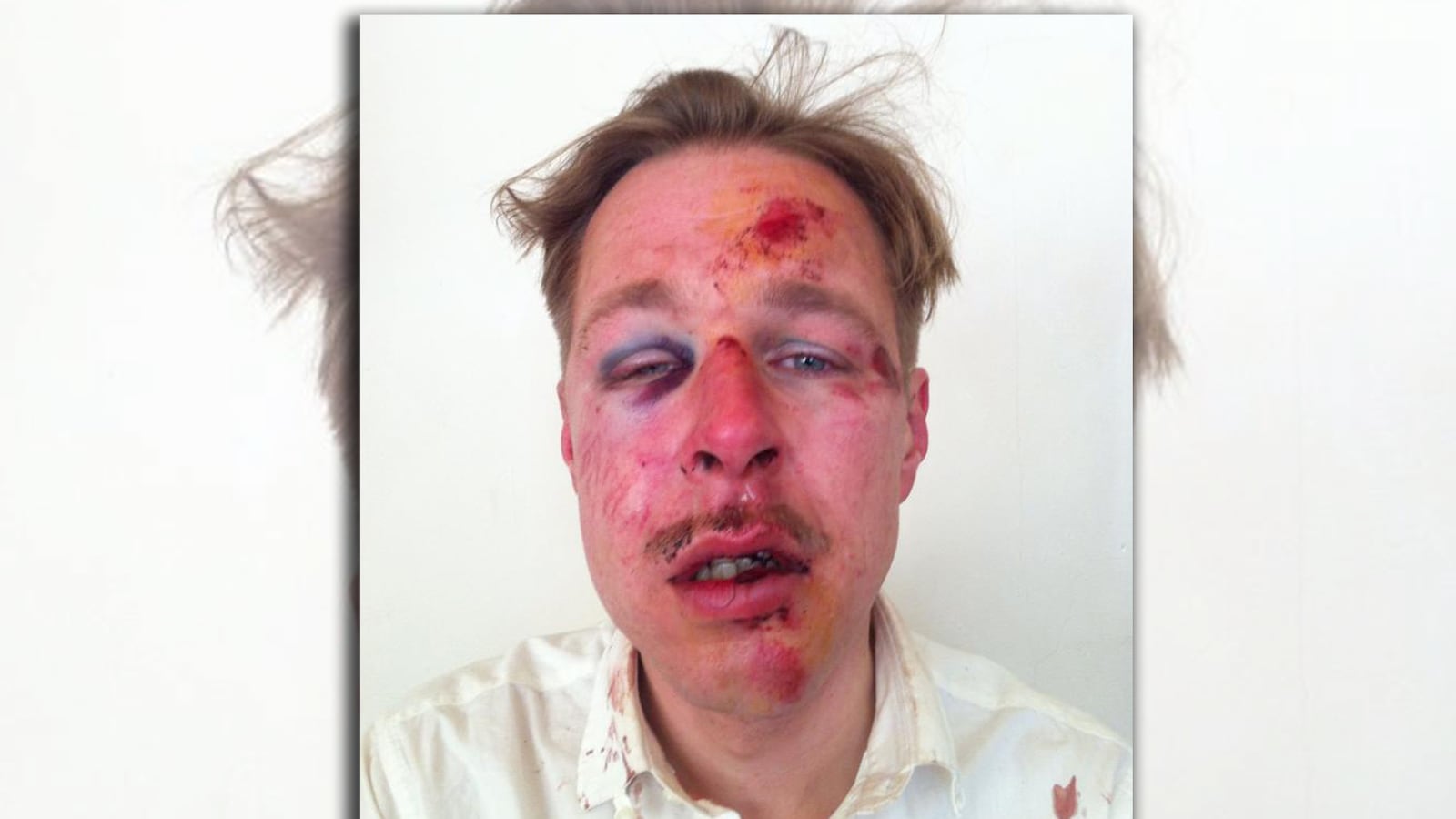This is the new face of homophobia, and it’s difficult to stomach.
“Sorry to show you this,” wrote French resident Wilfred de Bruijn on his Facebook page last week. Then he posted a picture of his face, which more resembled a piece of mashed-up horsemeat than a man. Contusions, five fractures, a lost tooth, bruises like over-ripe fruit—his face had reportedly been crunched and ground by two thugs who accosted him and his boyfriend, Olivier, while they were strolling in Paris.

Apparently the couple was in the 19th arrondissement Sunday when they were set upon. De Brujin says he woke up in an ambulance with blood all over his face, his bones broken, his face shattered. He couldn’t work for 10 days after.
The post quickly went viral, becoming a symbol of intolerance at a pivotal moment in French politics. The nation’s Senate approved on Friday a bill that will give gay couples the right to get married and adopt, and the landmark legislation is set to become law by summer. (Say what you will about President François Hollande—that he’s portly, stout, and uses bad hair dye, perhaps—but at least he keeps his promises.)
But the Socialist victory has not come without pain. There are reports of other attacks, which gay-rights groups attribute in part to campaigns against the marriage bill: gay couples in the 10th arrondissement; a hall in the Marais used by LGBT groups. Opponents of the proposed law see it as a threat to the traditional view of French family life. They cite the well-being of children as a reason why the vote should not have passed.
The anti-movement camp has staged some of the largest protests in French history. At the heart of it are the scary right wing, the growing extremists, the freaky neo-fascists who gather at the Jeanne d’Arc statue off Rue de Rivoli in Paris each May Day, traditionalists who still think we are back in the 1940s, and some Roman Catholics.
Also there are the usual bunch of bullies who enjoy picking on those weaker than themselves. The result has been a potent display of homophobia.
I cannot help but think about the rise of Fascism in Europe in the 1930s and the shocking way in which even the most gentrified people suddenly turned insane in the face of something they considered different. Human beings resist change, and in those days, it was socialism or communism or the rise of the common worker, which turned gangs of thugs loose on the streets. Now it is gay rights.
To be fair, the French public has reacted with shock. De Bruijn’s story has run in everything from the French woman’s magazine Grazia to the evening news channels. And it has shed a chill over France’s gay community. Is this what happens when you go for a walk on a Sunday morning in the wrong neighborhood and run into the wrong people? And what is the nature of “traditional marriage”?
Since February, when the National Assembly approved the article of marriage reform, this has been a heated issue. Perhaps the debate has been even more violently argued than Hollande’s taxing of the rich, sending them scurrying off to Belgium. Because this is the future.
But the good news is that people are not going to stand for homophobia. On Wednesday night in the pelting icy rain, two days before the vote in Senate, thousands gathered at Paris’s City hall. They were there to protest the “faces of hatred,” as one of their signs read, above photos of two of the leaders of the French anti-gay movement, Alain Escada and Frigide Barjot. The injured and now famous de Bruijn was also there.

“It is very important to be here, to show an image of love and dignity,” he told Agence France-Presse. Also at the demonstration was Christiane Taubira, a 61-year-old divorced mother of four and French Justice minister who has become another icon of the pro-marriage movement as a champion of gay rights.
The Guyanese-born minister is being compared to Simone Veil, a former minister of Health who fought to legalize abortion in 1975, and Robert Badinter, who fought for the death penalty to be abolished in 1981. She has become so popular that a gay website coined the term “Taubiramania.”
This week was also the anniversary of the Rwandan genocide, which began in April 1994 and continued for several months until a million people were killed. I am not drawing comparisons, but sifting through those old photographs, now 19 years old, and the memories of piles and piles of dead bodies, the smell of death in that tortured place, it is hard to stomach what human beings can do to each other.
I had a similar sick feeling when looking at de Bruijn’s brutalized face.
Bullies oppress marginalized people, whether homosexuals, Jews, Gypsies, Tutsis, Bosnian Muslims, or Palestinians, because they can. The way they justify their abuse is that they dehumanize them. The only way to defeat bullies is to stand up to them.
If homophobia is the rising wave—as European newspapers predict—then we must act now to defuse this growing hatred. As one of the posters read Wednesday night, homophobia kills.






